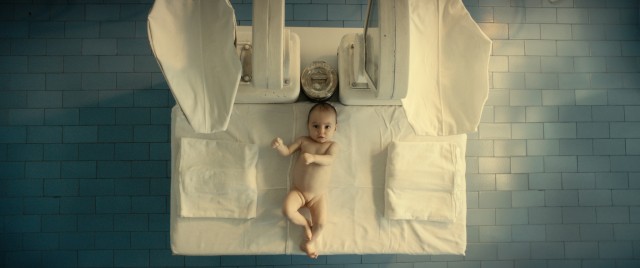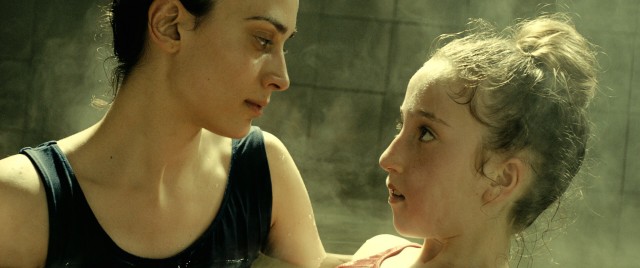
A baby born without a belly button in 1980 Bulgaria sets things in motion in VIKTORIA
VIKTORIA (Maya Vitkova, 2014)
IFC Center, 323 Sixth Ave. at West Third St., 212-924-7771
Lincoln Plaza Cinema, 1886 Broadway between 62nd & 63rd Sts., 212-757-2280
Opens Friday, April 29
bigworldpictures.org
 Motherhood is not necessarily for everyone, as depicted in Maya Vitkova’s impressive feature-film debut, Viktoria. Vitkova wrote, directed, and produced the darker-than-dark absurdist epic black comedy and intense family drama, which has won awards at festivals around the globe. Irmena Chichikova gives a boldly stark, devastating performance as Boryana, a young Bulgarian woman in 1980 trying to do everything she can — short of having an illegal abortion — to end her pregnancy. Her husband, Ivan (Dimo Dimov), and mother, Dima (Mariana Krumova), are furious with her, enraged at what she is doing. When she ultimately does have a baby girl, the child is born without a belly button, a symbol of the lack of connection between mother and daughter. Boryana is further incensed when the infant is selected as Baby of the Decade by Todor Zhivkov (Georgi Spasov), the real-life Bulgarian president and longtime head of the Communist Party. The state bestows special gifts on the family, but Boryana grows more and more disenchanted with the situation, her unhappiness evident in her every movement and blank stare. Meanwhile, Viktoria, who is played at nine years old by Daria Vitkova and at fourteen by Kalina Vitkova, keeps a close connection to Zhivkov, reveling in being a showpiece for the government; she even has a special phone line that links her and Zhivkov, a kind of umbilical cord between the two. But the fall of Communism in 1989 leads to sociopolitical changes that affect the relationship between Boryana, Ivan, Dima, and Viktoria as they have to find their place in the new world order.
Motherhood is not necessarily for everyone, as depicted in Maya Vitkova’s impressive feature-film debut, Viktoria. Vitkova wrote, directed, and produced the darker-than-dark absurdist epic black comedy and intense family drama, which has won awards at festivals around the globe. Irmena Chichikova gives a boldly stark, devastating performance as Boryana, a young Bulgarian woman in 1980 trying to do everything she can — short of having an illegal abortion — to end her pregnancy. Her husband, Ivan (Dimo Dimov), and mother, Dima (Mariana Krumova), are furious with her, enraged at what she is doing. When she ultimately does have a baby girl, the child is born without a belly button, a symbol of the lack of connection between mother and daughter. Boryana is further incensed when the infant is selected as Baby of the Decade by Todor Zhivkov (Georgi Spasov), the real-life Bulgarian president and longtime head of the Communist Party. The state bestows special gifts on the family, but Boryana grows more and more disenchanted with the situation, her unhappiness evident in her every movement and blank stare. Meanwhile, Viktoria, who is played at nine years old by Daria Vitkova and at fourteen by Kalina Vitkova, keeps a close connection to Zhivkov, reveling in being a showpiece for the government; she even has a special phone line that links her and Zhivkov, a kind of umbilical cord between the two. But the fall of Communism in 1989 leads to sociopolitical changes that affect the relationship between Boryana, Ivan, Dima, and Viktoria as they have to find their place in the new world order.

A mother (Irmena Chichikova) and daughter (Daria Vitkova) have difficulties connecting in impressive debut from Maya Vitkova
Chichikova is mesmerizing as Boryana, who says very little, her eyes and body emitting a stream of negative emotions that feel like impossible physical weights. Maya Vitkova uses milk as a metaphor throughout the 155-minute film; Boryana is unable to lactate, continuing the disconnection between mother and daughter, and a later scene in the rain takes it to another level. Viktoria is gorgeously photographed by Krum Rodriguez, from sparse interiors to stunning pathways in the woods, while Kaloyan Dimitrov’s piano-based score maintains the dour mood without becoming overly melancholic. The first half of the film is sardonic and bitterly funny, but as time marches on, the tone becomes more serious but no less absurd. Based on actual events, Viktoria is rather long and fades to black several times in what could have been mysteriously poetic finales, but the ultimate denouement has its own pure beauty. And in a touching end credit, Vitkova dedicates the film to her mother.